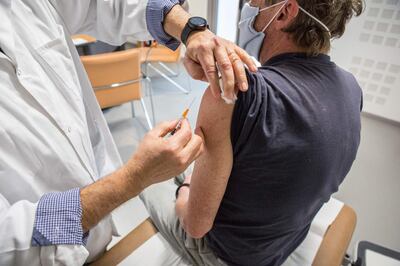France changed its policy on giving the Oxford-AstraZeneca Covid-19 vaccine to the elderly after mounting evidence of its efficacy in older people.
People between the ages of 65 and 74 with existing health problems can be given the vaccine, French Health Minister Olivier Veran said.
When EU regulators approved the vaccine for use, France said it would be given only to eligible people under 65 because of limited data from trials in older age groups.
President Emmanuel Macron said the vaccine was "quasi-effective" for over-65s.
In contrast, health authorities in Britain approved the shot for all age groups.
More data from trials has shown the efficacy of the vaccine, while France has struggled with a shortage of doses of the vaccines produced by Pfizer and Moderna.
Real-world data from Britain on the effectiveness of the AstraZeneca vaccine in older people should help inform decisions in other countries, Oxford vaccine Group director Prof Andrew Pollard said on Tuesday.
Data released on Monday by English health authorities showed the shot was "highly effective" in preventing serious illness in older people, with a more than 80 per cent reduction in hospital admissions.
UK Health Secretary Matt Hancock said the data was "slightly better for the Oxford jab than for Pfizer".
A Public Health England study showed that in people over the age of 80, a single dose of either the Pfizer-BioNTech or Oxford-AstraZeneca vaccine is more than 80 per cent effective in preventing hospital admission about three to four weeks after vaccination.
Prof Jonathan Van-Tam, deputy chief medical officer for England, said the results vindicated Britain's approach.
"I think in time the data emerging from the programme will speak for itself and other countries will doubtless be very interested in it," he said.
Other countries should be looking at real-world data from Public Health England, Prof Pollard said.
"The strength of evidence that we're now seeing ... all of that is being accessed by scientific committees in different countries and I'm sure will help support their decision-making," he told BBC radio.

Mr Veran told broadcaster BFMTV that while the AstraZeneca drug was approved for the 65 to 74 age group, people in France aged 75 and over would continue to be offered only the Pfizer and Moderna vaccines.
French and German authorities are trying to convince more people that the AstraZeneca-Oxford drug is as effective as other shots, with stocks of the vaccine going unused in both countries.
Only 273,000 doses were administered in France from 1.7 million received by the end of February, the Health Ministry said.
That was despite vulnerable groups being able to receive the shot directly from their doctor.
Experts say it is cheaper to produce than the Pfizer-BioNTech and Moderna vaccines and does not require ultra-cold storage, making it easier to store and transport.
AstraZeneca's fumbled release of testing data last November, coupled with questions over the ability of the vaccie to protect people against new Covid-19 variants, fuelled public scepticism in France and Germany. The vaccine is yet to receive approval in the US.
However, head of the MG France doctors' union, Jacques Battistoni, denounced the widespread "AstraZeneca bashing" that was causing many vials to go unused.
France’s vaccination co-ordinator Alain Fischer said the "bad press" surrounding the shot was "deeply unfair".
There are increasing calls in Germany to widen prioritisation and ensure no AstraZeneca shots go to waste.
By February 23, more than 1.4 million doses were delivered to Germany, but only 240,000 were used.
The government moved teachers and childcare workers from priority group three to group two, but some regional leaders urged Germany to go further.
"Not a single AstraZeneca dose should be left over or thrown out," Bavarian Governor Markus Soder said.
"Vaccinate anyone who wants it. Every day counts."
Chancellor Angela Merkel and Germany's 16 regional leaders will meet on Wednesday to discuss the next steps in the fight against the pandemic.
Mrs Merkel said the AstraZeneca shot was "a vaccine that can be trusted" and pleaded with the public not to pick and choose which shot they received.
When asked whether she would lead by example and take the AstraZeneca vaccine herself, Mrs Merkel said that because she was 66 she was not eligible.
The German vaccine commission "will very soon publish a new updated recommendation" after a study showed the drug to be effective for the elderly, said the commission's chief, Thomas Mertens.











